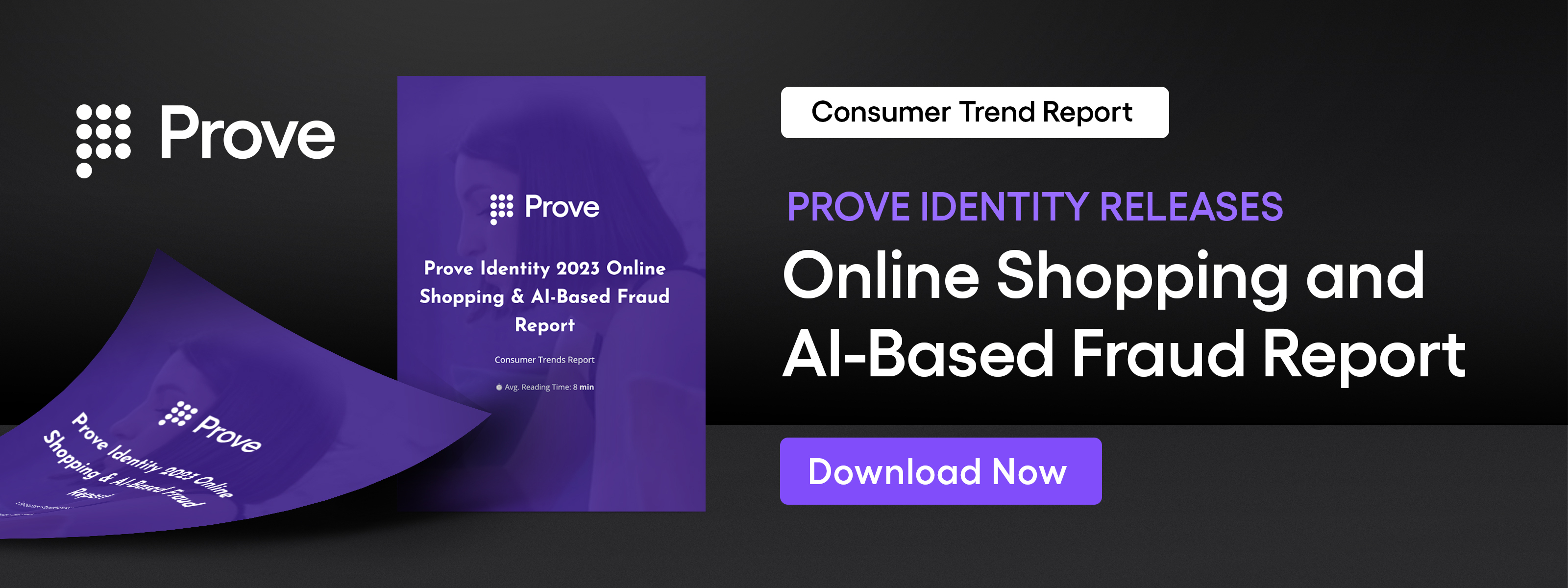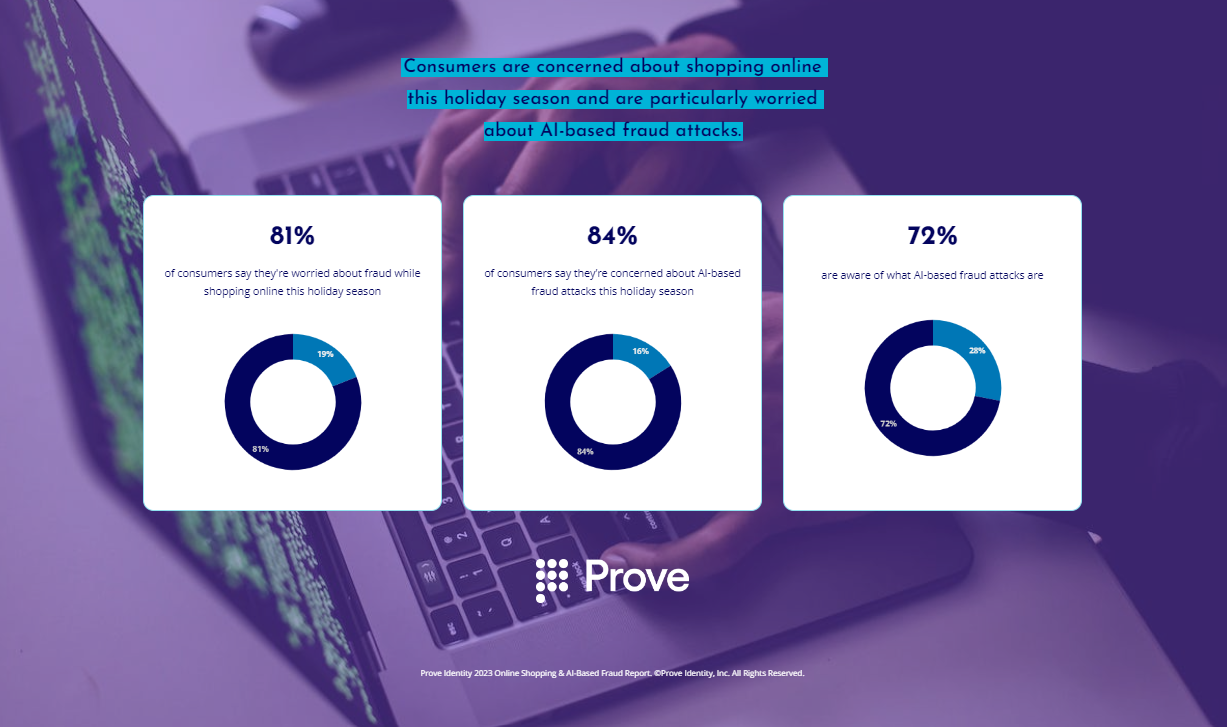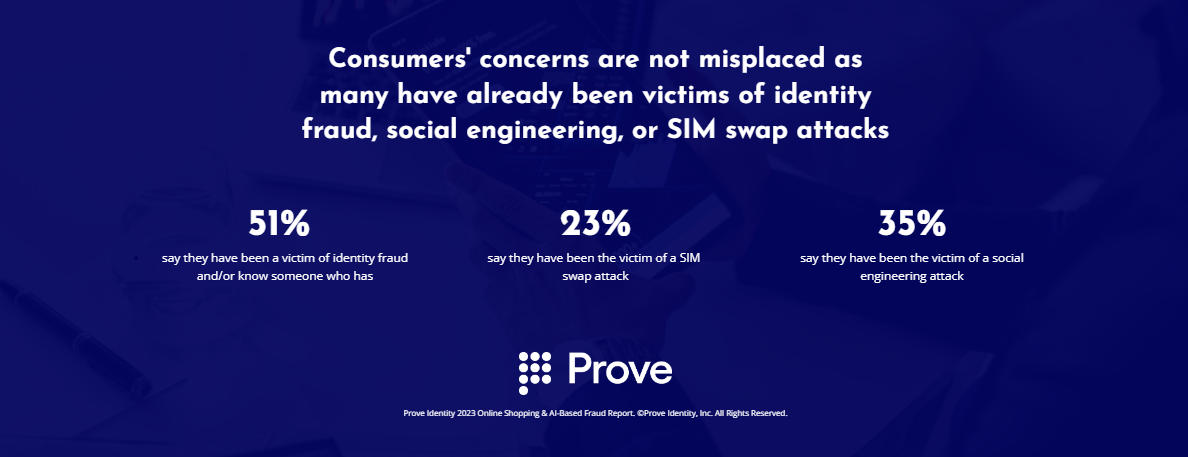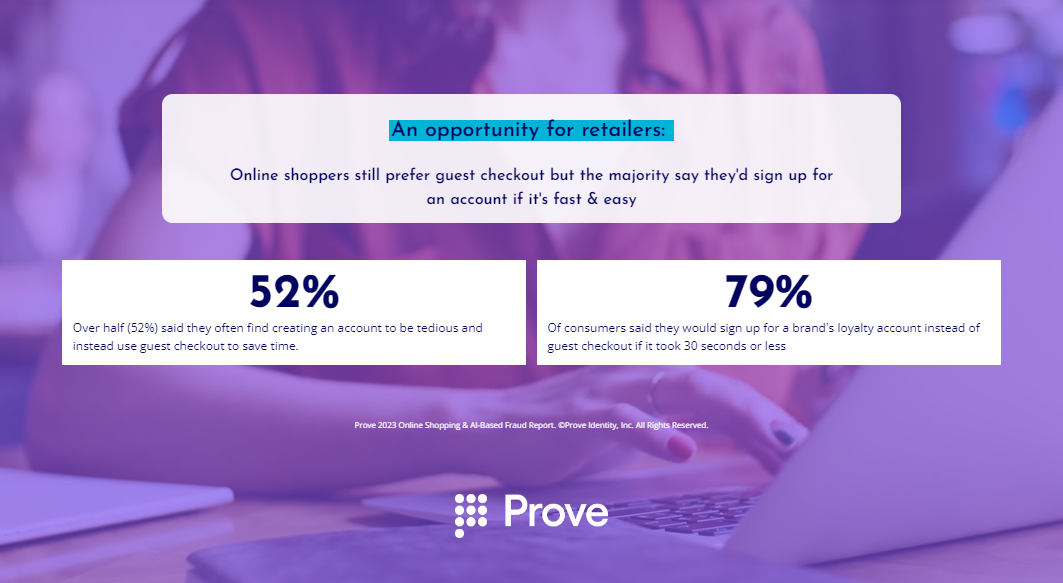2023 Online Shopping Report Shows 84% of Consumers Are Concerned About AI-Based Fraud This Holiday Season


Holiday shopping season is a favorite time of year for many, but as consumers everywhere start preparing to open their wallets ahead of Black Friday, a new type of threat has begun rearing its ugly head: AI-based fraud. The recent boom in AI capabilities and technologies has had widespread benefits for both companies and individuals but has also enabled fraudsters to launch more sophisticated scams, posing significant risks to consumers. But are consumers even aware of what AI-based fraud is? And how do they feel about identity verification and authentication, identity fraud in general, and the customer experience while shopping online?
To answer these questions, Prove has put together a 2023 Online Shopping and AI-Based Fraud Report summarizing the results of two surveys commissioned by Prove and conducted by market research company Dynata in October 2023. The report sheds light on consumer attitudes towards online shopping and fraud, but interestingly also reveals a significant opportunity for retailers to potentially capture more account signups through advanced identity verification and frictionless onboarding.

Read below for a summary of key findings from the report, or view the full report here (estimated reading time: 8 minutes) to gain insights into what the data means and recommendations on how retailers and ecommerce brands can take action.

Key Finding #1: Consumers are concerned about shopping online this holiday season, and are particularly worried about AI-based fraud attacks
The findings of the 2023 Online Shopping and AI-Based Fraud Report indicate that there is significant concern about fraud during the holiday season, with:
- 81% of consumers saying they are worried about fraud while shopping online this holiday season, and
- 84% of consumers saying they're concerned about AI-based fraud attacks this holiday season.
What is AI-based fraud?
AI-based fraud, also known as artificial intelligence-based fraud, refers to fraudulent activities or scams that are facilitated or enhanced by the use of artificial intelligence (AI) technologies.
What are some common examples of AI-based fraud?
Commons types of AI-based fraud include:
1. Social Engineering Schemes:
The use of AI enables fraudsters to turbo-charge social engineering scams such as phishing, vishing, and business email compromise (BEC) scams. AI helps criminals automate processes to create personalized, convincing, and highly effective messages to targets. As a result, cybercriminals can launch a higher volume of attacks in less time, with a heightened success rate.
2. Password Hacking:
Cybercriminals have harnessed AI to enhance their password-cracking algorithms. These smarter algorithms enable quicker and more accurate guessing, making hackers more efficient and profitable. With AI, hackers can guess passwords more effectively, posing a significant threat to the security of online accounts and systems. This calls for a proactive approach to fortifying passwords with advanced multi-factor authentication.
3. Deepfakes & Voice Cloning:
AI's ability to manipulate visual and audio content has given rise to deepfakes and voice cloning. Cybercriminals can use these techniques to impersonate individuals, spreading fabricated content across influential social media platforms. These malicious tactics can be combined with social engineering, extortion, or other types of fraud schemes, making them even more insidious.

Key Finding #2: Consumers' concerns are not misplaced as many have already been victims of identity fraud, social engineering, or SIM swap attacks
The high percentage of consumers who are concerned about fraud while online shopping is supported by the fact that many respondents had already experienced a form of digital identity fraud themselves, or know someone who has. Prove’s 2023 Online Shopping & AI-Based Fraud Report uncovered that:
- More than half (51%) of respondents have been a victim of identity fraud or know someone who has and
- 23% of consumers say they have been the victim of a SIM swap attack.
- Additionally, 42% of consumers believe their passwords are already available online and only 30% of consumers believe their passwords are safe, indicating a general lack of confidence in password security.
- Only 30% of consumers believe their passwords are safe, implying a general lack of confidence in password security.

Key Finding #3: Online shoppers still prefer guest checkout, but the majority say they would sign up for a brand’s loyalty account if it’s fast and easy
- 79% of consumers say they would sign up for a brand's loyalty account instead of guest checkout if the process took 30 seconds or less
- Despite more than half (52%) of respondents reporting they often find creating an account to be tedious and turn to using 'guest' options to save time.
💡Opportunity for retailers and ecommerce brands: The data above suggests that consumers choose guest checkout because they find the process of creating user accounts to be cumbersome, but they are open to signing up for loyalty accounts with brands if it's a quick process. Considering that 77% of consumers buy more products from retailers they have loyalty accounts with (Source: PYMNTS), retailers have a significant opportunity to capture more account signups and more revenue if they are able to implement technology that makes enrolling customers into loyalty programs faster and easier. Click here to learn about how smart merchants are taking advantage of the award-winning Prove Pre-Fill® onboarding solution to accelerate their signup process by 79% while reducing fraud by 75%.

Key Finding #4: While consumers are worried about fraud, they still engage in risky online habits
While consumers say they are concerned about online fraud, they are still engaging in unsecure practices such as saving passwords on their devices and buying from unfamiliar websites, making them more susceptible to AI hacks and data breaches. The allure of discounts can often outweigh concerns about the credibility and security of online retailers, leaving consumers who are most cost-sensitive at risk for more exposure.
- Almost half (48%) of respondents state they save their passwords on their devices, either using an in-browser password manager or saving in a note on a phone or desktop, and
- 67% of consumers say they would purchase from a website they're not familiar with if they were offering a deep (more than 40%) discount.
This data shows how everyday actions, no matter how innocent, can create vulnerabilities for consumers’ personal data.

Key Finding #5: The vast majority prefer mobile devices for both access & authentication
Most users surveyed found authentication through their mobile phones to be more convenient than using traditional passwords.
- Our survey found that 85% said they rely on their mobile phones to access their accounts, with 64% claiming they log in daily or multiple times per day, and
- 59% of respondents said that authentication through their phone is a more convenient option than passwords.
This data suggests that users seem to prefer mobile authentication over manual sign-ins to save time online by creating fewer steps for users to go through when making a purchase.
We hope you found the data and insights above helpful. Click here to access the full 2023 Online Shopping & AI-Based Fraud Report.

Keep reading
 Read the article: Why Prove Matters When Identity Data Leaks Become Critical Infrastructure Failures
Read the article: Why Prove Matters When Identity Data Leaks Become Critical Infrastructure FailuresAs large-scale data breaches expose billions of identity records, traditional identity verification and KYC models fail under automated fraud, making cryptographically anchored, persistent digital identity critical infrastructure.
 Read the article: How Prove’s Global Fraud Policy Stops Phone-Based Fraud Others Miss
Read the article: How Prove’s Global Fraud Policy Stops Phone-Based Fraud Others MissLearn how Prove’s Global Fraud Policy (GFP) uses an adaptive, always-on engine to detect modern phone-based threats like recycled number fraud and eSIM abuse. Discover how organizations can secure account openings and recoveries without increasing user friction.
 Read the article: Prove Supports Safer Internet Day: Championing a Safer, More Trustworthy Digital World
Read the article: Prove Supports Safer Internet Day: Championing a Safer, More Trustworthy Digital WorldProve proudly supports the goals and initiatives behind Safer Internet Day, a worldwide effort that brings together individuals, organizations, educators, governments, and businesses to promote the safe and positive use of digital technology for all, especially young people and vulnerable users.












